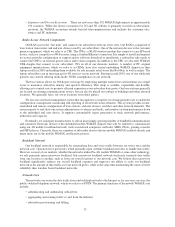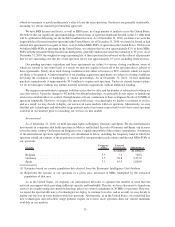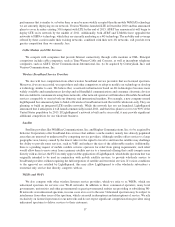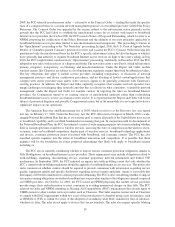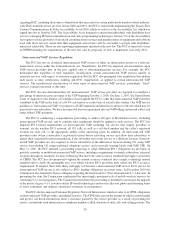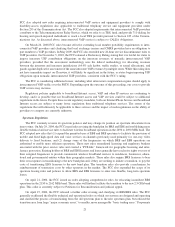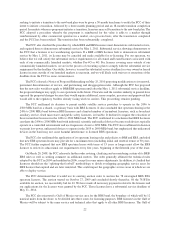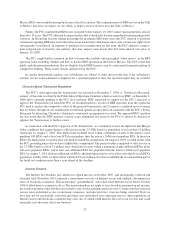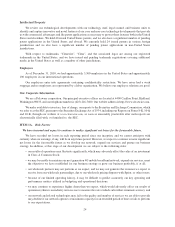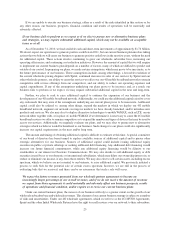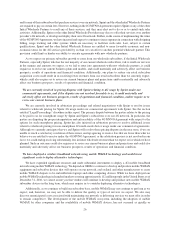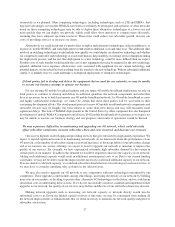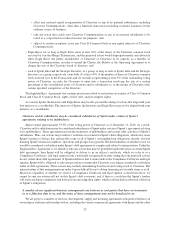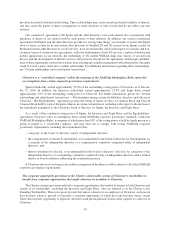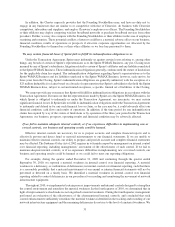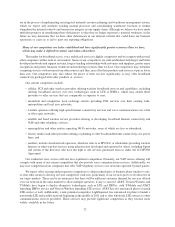Clearwire 2010 Annual Report Download - page 28
Download and view the complete annual report
Please find page 28 of the 2010 Clearwire annual report below. You can navigate through the pages in the report by either clicking on the pages listed below, or by using the keyword search tool below to find specific information within the annual report.Mexico BTAs were included among the licenses slated for auction. The commencement of BRS service in the Gulf
of Mexico may have an impact on our ability to deploy service in areas near the Gulf of Mexico.
Finally, the FCC clarified that EBS leases executed before January 10, 2005 cannot run in perpetuity and are
limited to 15 years. The FCC affirmed its general policy that it should not become enmeshed in interpreting private
contracts. In discussing its prior rulings governing the maximum EBS lease term, the FCC referred to previous
statements regarding EBS lease terms that it has never made before which may affect some of our lease rights if not
subsequently reconsidered. In response to petitions for reconsideration on this issue, the FCC adopted a compro-
mise proposal put forward by the industry that does impact some leases that had been entered into prior to
January 10, 2005.
The FCC sought further comment on how to license the available and unassigned “white spaces” in the EBS
spectrum band, including whether and how to license EBS spectrum in the Gulf of Mexico. The FCC noted that
public and educational institutions that are eligible to hold EBS licenses may be constrained from participating in
competitive bidding. These issues remain unresolved by the FCC.
In certain international markets, our subsidiaries are subject to rules that provide that if the subsidiary’s
wireless service is discontinued or impaired for a specified period of time, the spectrum rights may be revoked.
Clearwire/Sprint Transaction Regulation
The FCC’s order approving the Transactions was released on November 7, 2008. A “Petition for Reconsid-
eration” of the order was filed by the Public Interest Spectrum Coalition, which we refer to as PISC, on December 8,
2008 and is currently pending at the FCC. In its petition, PISC expressed its support for the FCC’s decision to
approve the Transactions but asked the FCC on reconsideration to 1) remove BRS spectrum from the screen the
FCC used to analyze the competitive effect of the proposed transaction; and 2) impose a condition on us to ensure
that we follow through on our commitment to build and operate an open network consistent with the FCC’s Policy
Statement by subjecting Clearwire’s third-party contractual arrangements to review. We opposed PISC’s petition
but also noted that the PISC petition’s narrow scope eliminated any need for the FCC to subject its decision to
approve the Transactions to further review.
In connection with the FCC’s approval of the Transactions, we committed to meet the Sprint Nextel Merger
Order conditions that require Sprint to offer service in the 2.5 GHz band to a population of no less than 15 million
Americans by August 7, 2009. This deployment included areas within a minimum of nine of the nation’s most
populous 100 BTAs and at least one BTA less populous than the nation’s 200th most populous BTA. In these ten
BTAs, the deployment covered at least one-third of each BTA’s population. On August 4, 2009, we filed a letter with
the FCC providing notice that we have fulfilled this commitment. The parties further committed to offer service in
the 2.5 GHz band to at least 15 million more Americans in areas within a minimum of nine additional BTAs in the
100 most populous BTAs, and at least one additional BTA less populous than the nation’s 200th most populous
BTA, by August 7, 2011. In these additional ten BTAs, the deployment had to cover at least one-third of each BTA’s
population. In May 2010, we filed a letter with the FCC providing notice that we fulfilled the second and final part of
the build-out condition more than a year ahead of the deadline.
Internet Taxation
The Internet Tax Freedom Act, which was signed into law in October 2007, and subsequently renewed and
extended until November 2014, imposed a moratorium on taxes on Internet access and multiple, discriminatory
taxes on electronic commerce. This moratorium “grandfathered” states that taxed Internet access before October
1998 to allow them to continue to do so. The moratorium does not apply to taxes levied or measured on net income,
net worth or property value and does not extend to a tax on telecommunications services. Certain states have enacted
various taxes on Internet access or electronic commerce, and selected states’ taxes are being contested. State tax
laws may not be successfully contested and future state and federal laws imposing taxes or other regulations on
Internet access and electronic commerce may arise, any of which could increase the cost of our services and could
materially and adversely affect our business.
23


